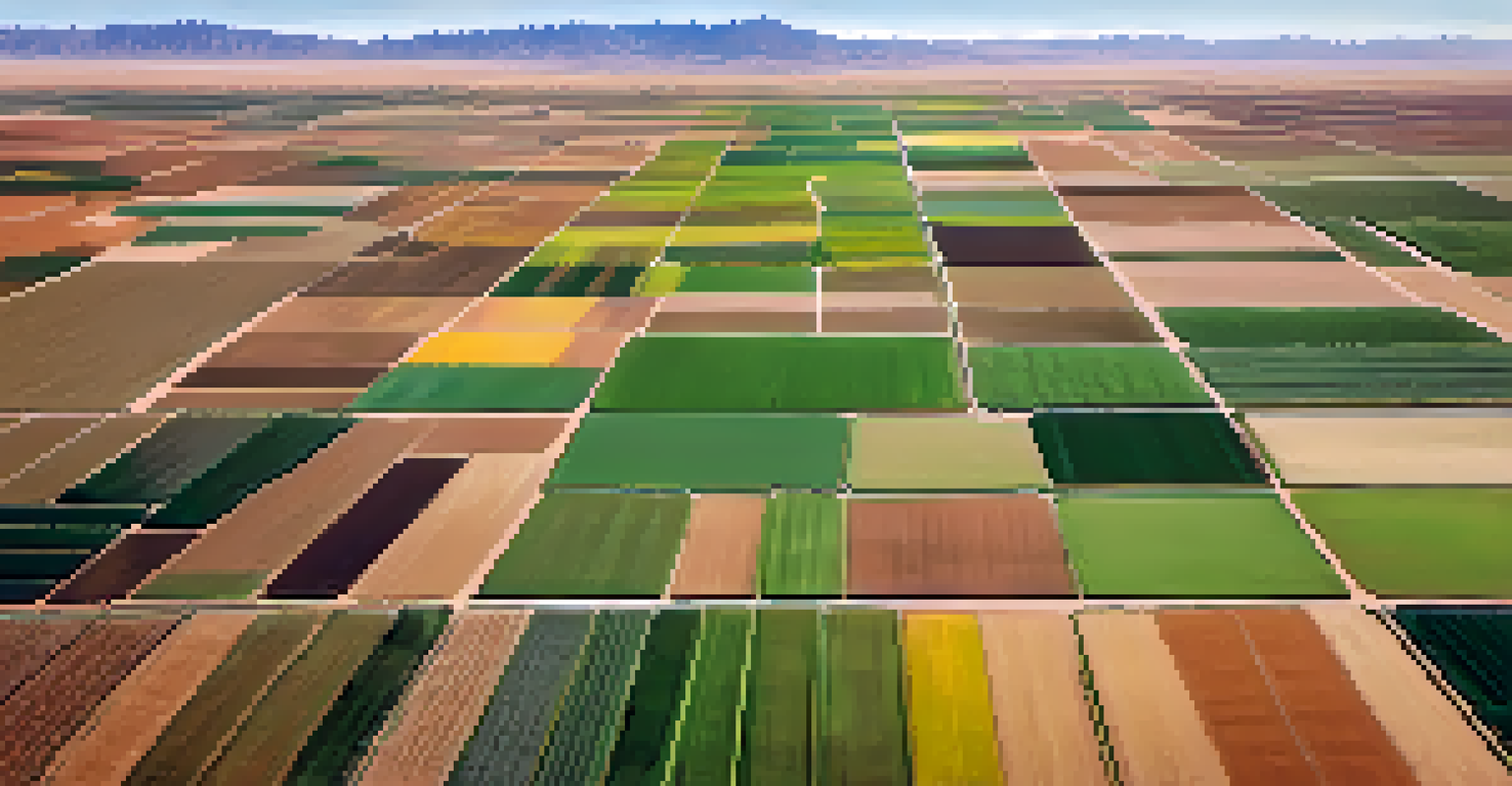AgTech Startups: Pioneering Change in Arizona's Agriculture

Introduction to AgTech in Arizona's Agriculture Scene
Agricultural technology, or AgTech, is reshaping how farmers operate in Arizona. With the state's unique climate challenges and water scarcity, innovative solutions are more crucial than ever. Startups in the AgTech sector are stepping up, providing tools and technologies that enhance productivity and sustainability in farming. This article delves into the exciting world of AgTech startups making waves in Arizona.
Agricultural technology is a key driver of innovation that can transform the way we produce food sustainably.
From drones that monitor crop health to software that optimizes irrigation, the diversity of solutions is impressive. These startups not only address local farming concerns but also contribute to a broader global movement towards sustainable agriculture. As the agricultural landscape evolves, Arizona is becoming a hub for these technological advancements.
By harnessing the power of innovation, these companies are helping farmers do more with less, ensuring that agriculture remains viable in the face of changing environmental conditions. With an increasing focus on efficiency and sustainability, AgTech startups in Arizona are leading the charge for a greener future.
Key AgTech Startups Making an Impact
Several AgTech startups are carving out a niche in Arizona's agricultural market. Companies like CropX are revolutionizing irrigation management by using soil sensors that provide real-time data to farmers. This technology not only conserves water but also ensures that crops receive the exact amount of moisture they need to thrive.

Another standout is Sunflower, which focuses on sustainable pest management through innovative biological solutions. By reducing reliance on chemical pesticides, they're helping farmers protect their crops while maintaining environmental health. These startups exemplify how technology can lead to more sustainable farming practices.
AgTech Drives Arizona's Farming Future
Innovative AgTech startups are enhancing productivity and sustainability in Arizona's agriculture sector, addressing unique challenges like water scarcity.
The impact of these startups extends beyond just the farms; they are also creating jobs and stimulating local economies. As these companies grow, they attract talent and investment, further solidifying Arizona's position as a leader in AgTech innovation.
Challenges Faced by AgTech Startups in Arizona
While the potential for AgTech in Arizona is immense, startups face their own set of challenges. One significant hurdle is gaining access to funding necessary for research and development. Many innovative ideas require substantial initial investment, and not all startups can secure the capital needed to get off the ground.
Sustainability in agriculture is not just a trend; it’s a necessity for the future of our planet.
Additionally, the agricultural sector often has a conservative approach to adopting new technologies. Farmers, accustomed to traditional methods, may be hesitant to embrace new solutions. Bridging this gap requires effective communication about the benefits and usability of these technologies.
Regulatory hurdles can also impede progress. Startups must navigate complex agricultural regulations and ensure compliance while trying to innovate. Overcoming these challenges is vital for the growth of the AgTech sector and the overall enhancement of Arizona's agricultural industry.
The Role of Universities and Research Institutions
Arizona's universities and research institutions play a pivotal role in fostering AgTech innovation. Collaborations between startups and academic entities lead to groundbreaking research and development. For instance, the University of Arizona conducts extensive studies on sustainable agricultural practices, providing valuable insights to AgTech entrepreneurs.
Moreover, these institutions often serve as incubators for emerging AgTech companies, offering resources, mentorship, and networking opportunities. This synergy between academia and industry strengthens the ecosystem and accelerates the development of practical solutions for farmers.
Collaboration Boosts AgTech Innovation
Partnerships between startups, universities, and farmers are fostering a robust ecosystem that accelerates the development of practical agricultural solutions.
Through workshops, seminars, and research initiatives, universities are helping to educate the next generation of AgTech leaders in Arizona. By cultivating talent and promoting innovation, they contribute significantly to the state's agricultural advancement.
Sustainability: A Core Focus of AgTech Startups
Sustainability is at the heart of most AgTech startups in Arizona. With growing concerns about climate change and resource depletion, these companies prioritize solutions that minimize environmental impact. For example, precision agriculture technologies allow farmers to use inputs like water and fertilizers more efficiently, reducing waste.
Startups are also exploring renewable energy options, such as solar-powered irrigation systems. This not only decreases reliance on fossil fuels but also lowers operational costs for farmers. By integrating sustainable practices, these companies are ensuring that agriculture can thrive for generations to come.
As consumers increasingly demand sustainably sourced products, AgTech startups are well-positioned to meet this need. Their commitment to sustainability not only benefits the environment but also aligns with market trends, making them attractive to investors and consumers alike.
Future Trends in Arizona's AgTech Landscape
The future of AgTech in Arizona looks promising, with several trends emerging that could further revolutionize the industry. One such trend is the increasing use of artificial intelligence and machine learning to analyze agricultural data. These technologies can provide insights that enhance decision-making for farmers, optimizing yield and resource use.
Additionally, advancements in biotechnology are paving the way for more resilient crop varieties. Startups are exploring genetic modifications that allow plants to withstand harsh climates, pests, and diseases. This innovation could significantly boost food security in Arizona and beyond.
Sustainability at AgTech's Core
With a focus on sustainable practices, AgTech startups are reducing environmental impact while meeting the growing consumer demand for responsibly sourced products.
As AgTech continues to evolve, we can expect to see greater collaboration between startups and established agricultural entities. This partnership will drive the adoption of new technologies, leading to more efficient and sustainable farming practices across the state.
Conclusion: Embracing the AgTech Revolution
In conclusion, AgTech startups are playing a crucial role in transforming Arizona's agriculture landscape. By addressing local challenges with innovative solutions, they are not only enhancing productivity but also promoting sustainability. As these startups continue to grow and evolve, their impact on the agricultural industry will only strengthen.
The collaboration between startups, universities, and farmers creates a robust ecosystem that fosters innovation and progress. By embracing technology, Arizona is poised to lead the way in sustainable agriculture, setting an example for other regions to follow.

As we look to the future, it's clear that the AgTech revolution is just beginning. With ongoing support and investment, Arizona's AgTech startups will continue to pioneer change, ensuring a resilient and sustainable agricultural sector for years to come.